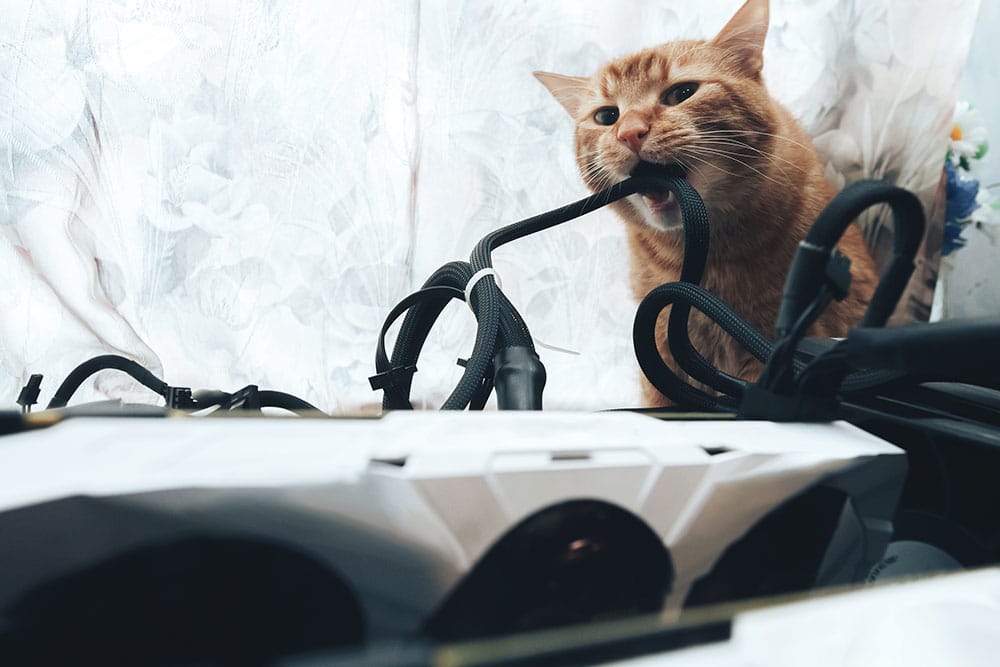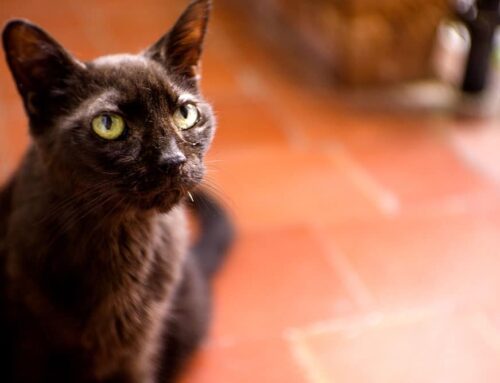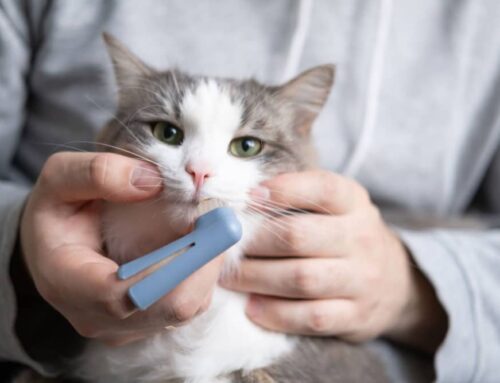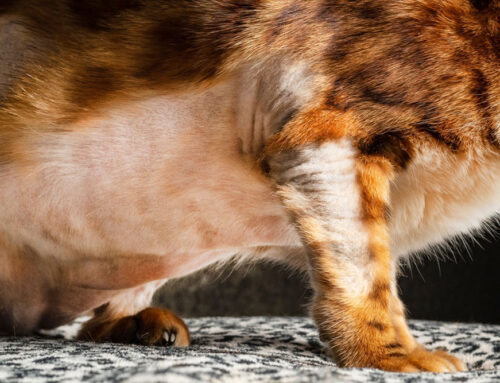When Curiosity Turns Critical: What Happens if Your Cat Swallows Something
Cats have a talent for getting into trouble, often in ways their owners never expect. One day it’s a missing hair tie, the next it’s a ribbon from a gift bag, or a shiny piece of tinsel that was just too tempting. Sewing needles still threaded, bits of plastic, or plant leaves and stems can all end up swallowed. Sometimes these objects pass without issue. Other times, they create dangerous blockages that require surgery and hospitalization. Even hairballs can become part of the problem if they mix with other material.
At Just Cats Clinic, we see these situations often- some are minor, but others quickly become life-threatening. The challenge for cat owners is knowing when curiosity is harmless and when it’s the start of a medical emergency.
When to Suspect a Foreign Body
Cats are subtle when they don’t feel well. Unlike dogs, cats often show quieter symptoms. For cat owners, that means paying attention to even mild changes. If a cat that never misses a meal suddenly skips, start monitoring closely. If your cat hides more than usual, check in often. Because cats work so hard to mask illness, what looks minor can already be serious.
Vomiting deserves special attention. If your cat cannot even hold down water, go to the vet immediately. Dehydration and electrolyte imbalances develop fast. Vomiting water or undigested food may mean something is stuck and preventing passage through the stomach or intestines, and should be seen urgently. Combination with other symptoms is a key warning sign. Ongoing vomiting, repeated retching, no appetite, straining without stool, sudden lethargy, or hiding behaviors all suggest more than a simple upset stomach.
Types of Obstructions
The kind of object swallowed changes how dangerous it is and how it is treated:
- Complete obstruction: Food and water cannot pass at all. Cats often vomit repeatedly, become lethargic, and deteriorate quickly.
- Partial obstruction: Small amounts can move around the object, causing intermittent vomiting, decreased appetite, and weight loss that may be mistaken for something mild.
- Linear obstruction: String, yarn, ribbon, or sewing thread can catch at the tongue or stomach while the rest threads through the intestines, pulling them into folds and risking tearing.
- Sharp foreign bodies: Sewing needles and plastic fragments can puncture the digestive tract, causing internal infection or sepsis.
How Vets Diagnose a Foreign Body
At Just Cats Clinic, diagnosis begins with stabilization: IV fluids for dehydration, pain relief, and careful monitoring. A physical exam may reveal string anchored under the tongue or abdominal discomfort.
There are many other conditions that have symptoms similar to a foreign body, so other testing is done to rule out those conditions. Kidney disease, pancreatitis, toxin ingestion, and a number of other illnesses can all cause vomiting and lethargy.
Imaging is critical. X-rays can reveal dilated intestines or gas buildup. Ultrasound offers more detail, identifying blockages, compromised blood flow, or damage to the intestinal wall. Bloodwork checks hydration, electrolytes, and organ function before anesthesia.
Sometimes the answer is not clear, and exploratory surgery may be required. If the problem is not a foreign body, biopsies and further testing may be recommended to rule out other conditions such as inflammatory bowel disease, cancer, or severe gastrointestinal infection.
Treatment Options for Cats
Supportive care. Cats that are stable and have swallowed a small, smooth, non-toxic object may be hospitalized for fluids, anti-nausea medication, and monitoring. Repeat imaging may be used to track whether the object passes naturally.
Endoscopy. If the object is in the stomach or upper small intestine, endoscopic procedures may be recommended to remove it without surgery. This approach generally only works well for smaller objects swallowed recently.
Surgery. When blockages are further down, sharp or dangerous objects are involved, or tissue may be damaged, surgery is needed.
- Gastrotomy: Opening the stomach to remove an object.
- Enterotomy: Opening the intestines to retrieve a lodged item.
- Resection and anastomosis: Removing a damaged or dead portion of intestine and reconnecting the healthy ends.
With foreign bodies, timing and the type of item swallowed shape the outcome. Acting quickly can mean the difference between a minor procedure and days of hospitalization. After surgery, cats require careful monitoring for pain, infection, and return of normal intestinal function.
A hair tie costs pennies, but surgery can cost thousands. We accept Pet insurance or CareCredit and Scratchpay to help ensure you can act fast when your cat needs urgent care.
Hospitalization and Ongoing Care
Treatment does not end once the object is removed. The hours and days after surgery are just as important, and hospitalization may be needed to give your cat the best chance at a smooth recovery. At Just Cats Clinic, we follow the standards of an AAHA-accredited hospital and a certified Cat-Friendly Practice. That means every hospitalized cat is cared for in a calm, feline-focused environment, with quiet spaces, gentle handling, and medical protocols designed specifically for cats.
During hospitalization, our team provides:
- Intravenous fluids to correct dehydration and support circulation.
- Pain management tailored for feline patients, often using multimodal therapy to minimize side effects.
- Nutritional support, including early re-feeding when safe or feeding tube placement if needed.
- Monitoring of heart rate, breathing, blood pressure, and comfort around the clock while in our care.
- Infection prevention and wound care to protect surgical sites.
- Adjunctive therapies such as our therapy laser to reduce inflammation and promote healing.
Our veterinarians provide daytime urgent care and can “squeeze in” emergency drop-offs when needed. On weekends, our urgent care service includes a weekend overnight hospitalization program where cats can remain for fluids, pain control, and recovery after foreign body surgery. If advanced overnight care beyond our capacity is required, we work directly with trusted 24-hour ER hospitals to ensure seamless transfer and continuity of care.
Even with expert treatment, complications are possible. These may include:
- Suture leakage that can lead to peritonitis, a life-threatening abdominal infection.
- Sluggish intestinal movement (ileus), keeping cats nauseated and vomiting.
- Septic peritonitis if the intestine perforates.
- Short bowel syndrome if large portions of the intestine must be removed, causing long-term digestive issues.
- Aspiration pneumonia in cats that inhaled vomit before or after surgery.
Hospitalization allows our team to detect and address these risks early. Some of the complications take days to appear. Cats remain under close supervision until they are stable, eating, comfortable, and ready to continue recovery safely at home.
Home Care After Foreign Body Surgery
Once your cat comes home, your role in recovery is just as important as the hospital stay. Cats need a calm, controlled environment to heal safely. We recommend keeping your cat away from other pets, who may want to groom or lick the incision.
Confinement is key. Setting up a quiet recovery space, such as a crate or small room without cat trees or furniture to climb, prevents jumping and reduces the risk of reopening the incision. Use shredded paper or a pelleted litter instead of clumping litter to avoid contamination of the surgical site.
An Elizabethan collar (cone) and in some cases a recovery suit are essential to stop licking or chewing at the incision. Even a small amount of interference can delay healing or cause infection. If you’re unsure how to monitor comfort, tools like the Feline Grimace Scale can help you recognize signs of pain that cats often hide.
Daily checks of the incision for swelling, redness, or discharge are important. This cat surgery aftercare guide has helpful tips for spotting problems early and supporting your cat’s comfort at home.
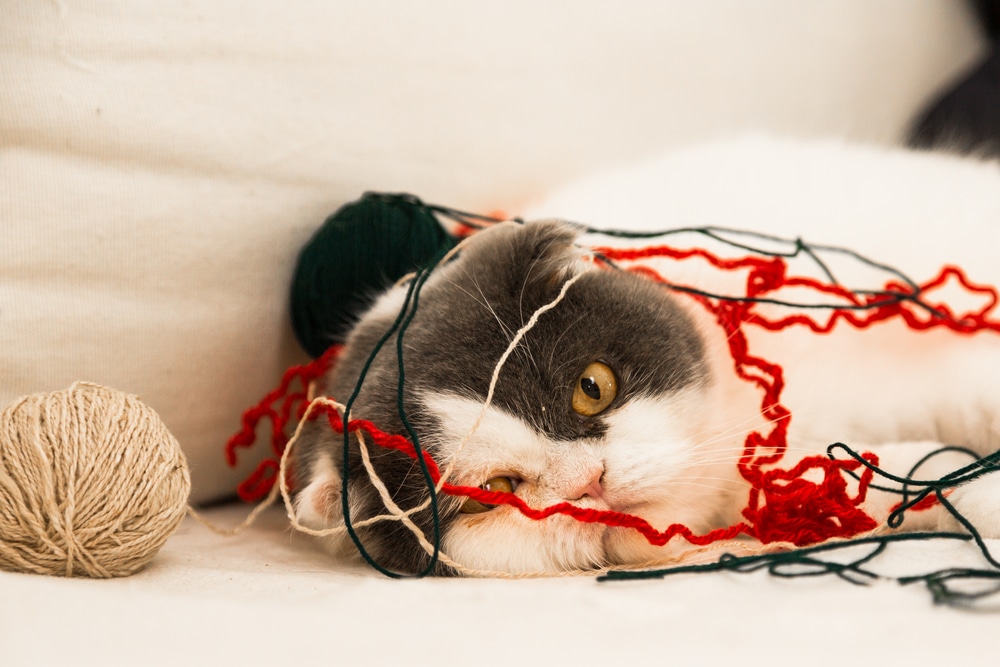
We’re Here When You Need Us
Foreign body cases can be frightening, but with prompt care most cats recover fully. The Just Cats Clinic team is proud to be AAHA accredited and a certified Cat-Friendly Practice. This means we provide a calm environment, feline-specific handling, and high standards of medicine.
If you think your cat has swallowed something they shouldn’t, don’t wait. Call us. Quick action means peace of mind for you – and the best chance of recovery for your cat.


